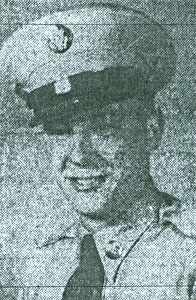Delbert Frank Dewey, age 22, from Los Angeles County Inglewood, California .
Spouse: Ina Dewey
Service era: Korea
Date of death: Thursday, February 1, 1951
Death details: By mid-November 1950, U.S. and Allied forces had advanced to within approximately sixty miles of the Yalu River, the border between North Korea and China. On November 25, approximately 300,000 Chinese Communist Forces (CCF) “volunteers” suddenly and fiercely counterattacked after crossing the Yalu. The 2nd Infantry Division, located the farthest north of units at the Chongchon River, could not halt the CCF advance and was ordered to withdraw to defensive positions at Sunchon in the South Pyongan province of North Korea. As the division pulled back from Kunu-ri toward Sunchon, it conducted an intense rearguard action while fighting to break through well-defended roadblocks set up by CCF infiltrators. The withdrawal was not complete until December 1, and the 2nd Infantry Division suffered extremely heavy casualties in the process. Corporal Delbert Frank Dewey, who joined the U.S. Army from California, served with Headquarters Battery, 38th Field Artillery Battalion, 2nd Infantry Division. He was captured by enemy forces on November 30, 1950, as his unit made a fighting withdrawal from Kunu-ri to Sunchon. He was marched to a prisoner of war holding camp in the Pukchin Tarigol Valley, where he died of starvation and pneumonia on February 1, 1951, under the care of a captured Army doctor. His remains have not been recovered or identified among those returned to U.S. custody. Today, Corporal Dewey is memorialized on the Courts of the Missing at the National Memorial Cemetery of the Pacific. His name is also inscribed on the Korean War Veterans Memorial Wall in Washington, DC, which was updated in 2022 to include the names of the fallen.
Source: National Archives, Defense POW/MIA Accounting Agency, Los Angeles Evening Citizen News (1955)

